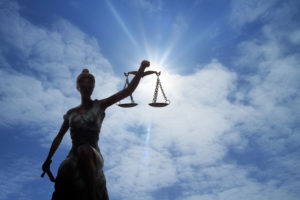Objection! The Word of God Doesn’t Belong in a Courtroom

Religion in the courtroom is extremely problematic because of the responsibility and trust placed in judges and juries to make impartial and rational decisions. Personal prejudices that favor religion over nonreligion become factors in what should otherwise be a secular examination of the facts and oral arguments, while the courts’ duty to uphold the law is tainted by any use of religion to examine the trustworthiness or morality of the accused.
For example, this past December longtime US Rep. Corrine Brown (D-FL) was found guilty of eighteen charges of corruption relating to a phony educational charity, including filing false tax returns and conspiracy to commit mail and wire fraud. A juror in the case was dismissed the day before the verdict was reached after sharing that the “Holy Spirit” told him that Brown was innocent. Brown’s legal team is now asking a federal appeals court to overturn her conviction, $800,000 fine and five-year prison sentence on the grounds that the juror was improperly dismissed.
In an even more egregious instance of invoking religion in the courtroom, a Texas judge recently recused himself from a trial in which a woman was accused of trafficking her teen niece to a much older man. Judge Jack Robison reportedly told jurors that God told him Gloria E. Romero Perez was not guilty of that crime. Robison is currently on leave but is expected to return to work on January 31.
Many judges are outspoken about the influence of religion on their decision-making. In Arkansas, Pulaski County Circuit Judge Wendell Griffen was barred from considering execution-related cases after blocking the use of a lethal injection drug and participating in an anti-death penalty demonstration. Photographs of Griffen strapped to a cot brought forth images of a death-row inmate awaiting lethal injection. Judge Griffen, who is also a Baptist pastor, said he was portraying Jesus and participating in a Good Friday vigil with his congregation. There are plenty of secular arguments to be made against the death penalty—invoking Jesus isn’t necessary or appropriate.
The separation of church and state is a firmly established principle in our Constitution. The First Amendment has two provisions concerning religion, one of which is the Establishment Clause prohibiting the government from “establishing” a religion. What constitutes an “establishment of religion” is often governed under the three-part test set forth by the US Supreme Court in Lemon v. Kurtzman, 403 U.S. 602 (1971). Under the “Lemon” test, government can assist religion only if (1) the primary purpose of the assistance is secular, (2) the assistance must neither promote nor inhibit religion, and (3) there is no excessive entanglement between church and state.
In her 2011 essay, “Balancing Judgment: The Effects of Religion in U.S. Courtrooms,” Eve Turow writes: “While ingroup/outgroup prejudices are common, religion powerfully ignites group identities because it socializes behavior and creates a common community.” Christianity is privileged among all religions and in our nation. Characteristics of the majority (Christians) have become so internalized in American society that they are now accepted as the social norm. With this understanding, defendants and plaintiffs have to appeal to the jurors’ or judge’s religious biases for any chance at a favorable verdict—often with the assumption that the jurors are affiliated with Christianity.
In a 2005 CUNY Law Review article titled “Quoting the Bible: The Use of Religious References in Judicial Decision-Making,” Sanja Zgonjanin highlights that sectarian practices and expressions are accepted and even sanctioned by courts citing context or tradition. These practices include opening the Supreme Court session with “God save the United States and this honorable Court,” opening a legislative session with a prayer, recognizing the nation in the Pledge of Allegiance as “one Nation under God,” and not only printing “In God We Trust” on our money but posting the motto in court rooms, congressional chambers, and other places of government business.
The pervasive nature of religious identity in our society makes it hard to completely enforce a prohibition on religion even within our courtrooms. However, interpreting God’s will or facilitating God’s vengeance should never supersede making rational decisions in sentencing. In order to make sure court litigants receive the due process to which they are entitled, religion cannot serve any kind of legitimate purpose in the courtroom. Justice is said to be blind, but blind faith in God’s spoken word is no means to ensuring that justice is served.
